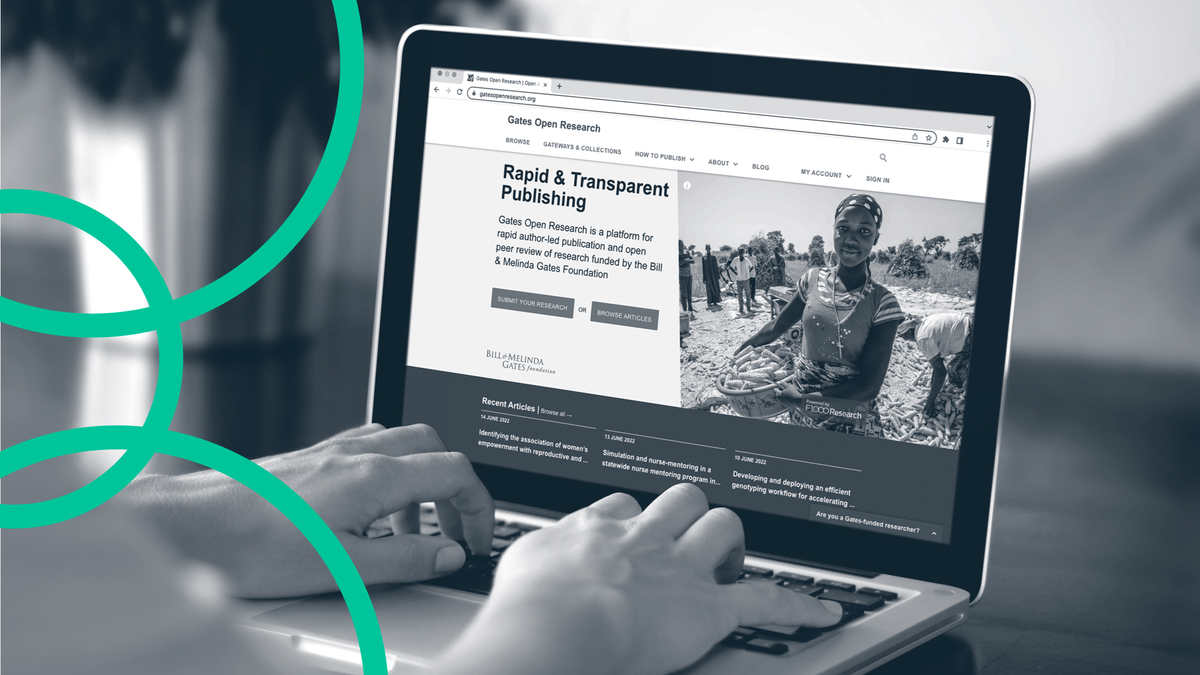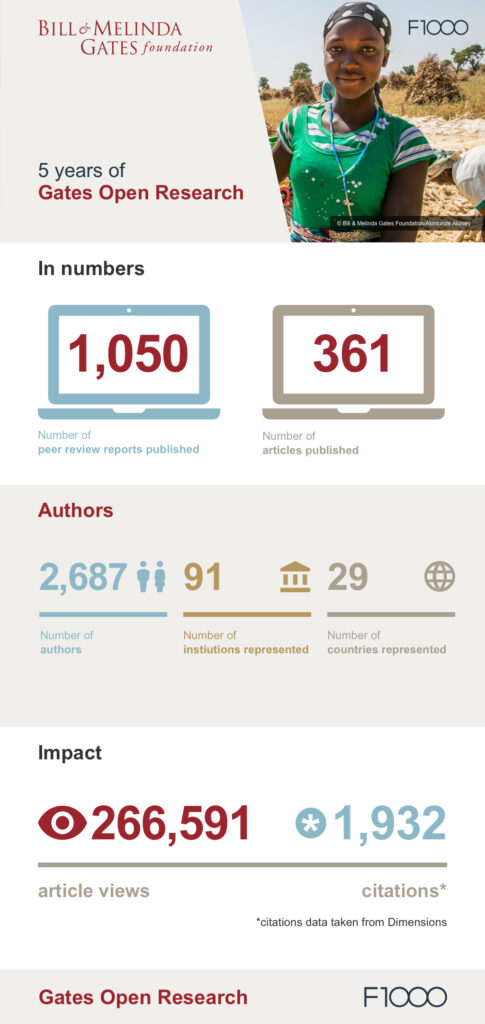
Enabling the Bill & Melinda Gates foundation to solve the challenges of the 21st century: an F1000 case study
The Bill & Melinda Gates foundation is an organization in the United States launched by Bill Gates and Melinda French Gates in 2000. It is now reported to be the world’s second largest charitable organization as of 2020. Published research resulting from the foundation’s funding aims to help fight poverty, disease, and inequity around the globe.
Solving the challenges of the 21st century
The Bill & Melinda Gates foundation works with thousands of researchers and institutions globally. Through these collaborations, the foundation enables research with real-world impact, driving change and improving the quality of life for billions of people.
For this reason, the Bill & Melinda Gates foundation allocates grant funding to subject areas reflecting critical real-world problems. These areas include:
- Global health
- Climate change
- Education
- Nutrition and agriculture
- Sustainable development
Back in 2017, the foundation recognized that the world’s greatest challenges required a different approach to convert research into solutions, quickly.
“To solve the challenges of the 21st century, we must accelerate open access to high-quality research on health, education, and economic development. Gates Open Research is designed to ensure that the research we fund can be of immediate benefit to society.”
– Trevor Mundel, President of Global Health at the Bill & Melinda Gates Foundation
To achieve true real-world impact, the foundation needed to enable their grantees to disseminate their research openly with minimal delay, and without barriers or restrictions.
What they needed was a new approach to open research – which is where F1000 comes in.
Rapid and transparent publishing
F1000 provides tailored open research publishing solutions for organizations to help them achieve greater impact for their research projects. Articles on F1000 Platforms benefit from rapid publication, transparent peer review, and guidance on making all research data openly available.
The Bill & Melinda Gates foundation chose to partner with F1000 to ensure that high-quality research funded by the foundation could be of immediate use and benefit to society; this is how Gates Open Research came to life.
Rapid publication
One of the core principles of the F1000 model is rapid publication, where the lengthy delays of traditional peer review are mitigated by moving this step in the process after publication. Gates Open Research enables researchers funded by the foundation to share and publish their work in as few as 14 days. Peer review takes place right after an article has been published openly on the Platform.
Rapid publication is crucial, especially during public health emergencies like the COVID-19 pandemic. Gates Open Research maximizes research impact by offering immediate, easy access to essential research which has helped inform responses from the research community in real time.
Open access
The Bill & Melinda Gates foundation advocates for open access, supporting the broad dissemination and reuse of the research they publish – including underlying research data.
Through their open access policy, the foundation mandates how researchers can publish their research and data openly. The policy aligns with the principles of Plan S which requires that scientific publications that result from research funded by public grants must be published in compliant open access platforms.
Gates Open Research has enabled the foundation to champion open access principles, by providing grantees with a place to publish their work completely openly. The F1000 model that powers Gates Open Research aligns with the principles of Plan S, including price transparency around article processing charges (APCs). What’s more, all research outputs published on the Platform (and their underlying datasets) are openly accessible and reusable by the wider research community, and the general public.
Diverse article types
The Platform further drives research impact through the variety of different article types on offer. Beyond traditional Research Articles, researchers funded by the Bill & Melinda Gates foundation can showcase more of their project through a range of novel article types, including:
By publishing a wider range of outputs, Gates-funded researchers can benefit from the increased discoverability of their work, which in turn leads to greater impact.
Some of these formats are particularly good at maximizing the potential impact of a research project – for example, Data Notes. This novel article type shares valuable contextual information about original research datasets in a highly discoverable way, enabling other researchers to find, access, use (and-reuse) the data, either to reproduce the original results, or to support new research in a related field.
Curating research into themes
Gates Open Research further drives impact by curating research into themed portals on the Platform, known as Gateways and Collections. These dedicated content hubs are led by expert advisors in each field, and enable users to find research on specific topics quickly and easily.
Coronavirus (COVID-19) Collection
The Coronavirus Collection was created in response to the worldwide outbreak of the virus. This Collection allows researchers to publish a wide range of outputs related to coronavirus, enabling further research at speed, and supporting evidence-based public health responses in real time.
World Mosquito Program Gateway
Gates Open Research has partnered with the World Mosquito Program to curate content from their research on mosquito-borne diseases, including dengue, Zika, yellow fever, and chikungunya, into a dedicated Gateway on the Platform. The Gateway hosts a number of Research Articles which explore how the Program has used naturally occurring bacteria Wolbachia to reduce the ability of mosquitoes to transmit viruses that cause life-threatening disease.
Research with real-world impact
An F1000 powered Platform, Gates Open Research accelerates the reach of knowledge and puts it in the hands of those who can shape the future.

COVID-19 research
Gates Open Research provides grantees with a place to rapidly publish their work on critical global issues, with the Platform hosting a range of high-profile and impactful COVID-19 papers, including:
- A Research Note by Dasgupta et al. which evaluates the potential effect of COVID-19 on access to essential sexual and reproductive health care services, including family planning. In less than 2 years since its publication, this article has received more than 4,400 views and 680 downloads.
- A Data Note by Klugman et al. which examines COVID-19 mortality among younger age groups in African and South Asian minority communities. 6 months after its publication, the paper was cited by the World Health Organization in their guidance documents.
World Mosquito Program research
The Platform also hosts an array of insightful papers on mosquito-borne diseases including:
- A Research Article by O’Neill et al. which reports the first successful wide-scale implementation of Wolbachia to control mosquito-transmitted viruses in the Australian city of Townsville. In almost 4 years, the article has received more than 10,000 views and 191 citations. More recently, the World Health Organization referenced this paper in 4 policy documents.
- A Research Article by O’Neill et al. which illustrates how a particular strain of Wolbachia has helped eliminate local dengue transmission across different areas in Australia. In 2 years, the article has received more than 4,000 views and 116 citations, and has achieved coverage in international media outlets including the New York Times.
Advocates of the F1000 model
Both researchers and key stakeholders at the Bill & Melinda Gates foundation have praised the speed, transparency, and accessibility underlying the F1000 model.
“We believe open research helps achieve rapid dissemination of the complete article …[therefore] reaching more audience than the subscription-only model.”
– Ankita Mukherjee and Rakesh Parasha, Gates Open Research authors
“It provides flexibility that does not exist elsewhere in how the community can provide quick, transparent, feedback with the option to future changes. […] All elements of research will be transparently displayed which will lead to higher impact of the work and ability to provide full credit to the researchers involved.”
– Ashley Farley, Program Officer of Knowledge & Research Services at the Bill & Melinda Gates foundation
Visit Gates Open Research now to browse over 380 impactful articles from Gates-funded researchers around the world. To find out how our publishing solutions can help your organization achieve its open research goals, get in touch today.
